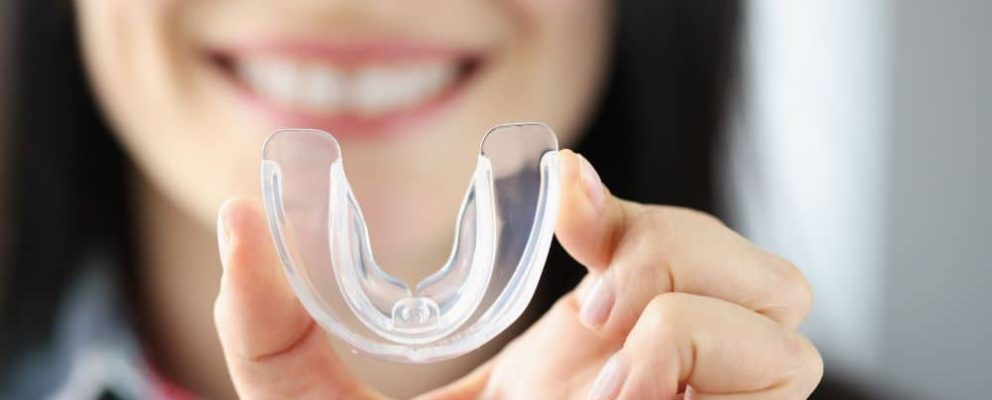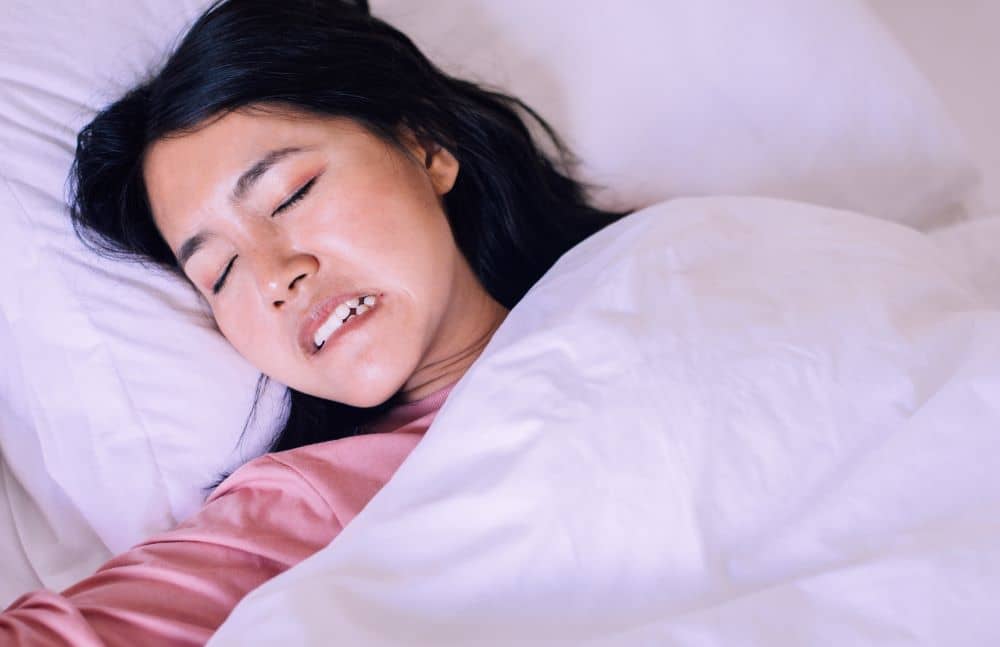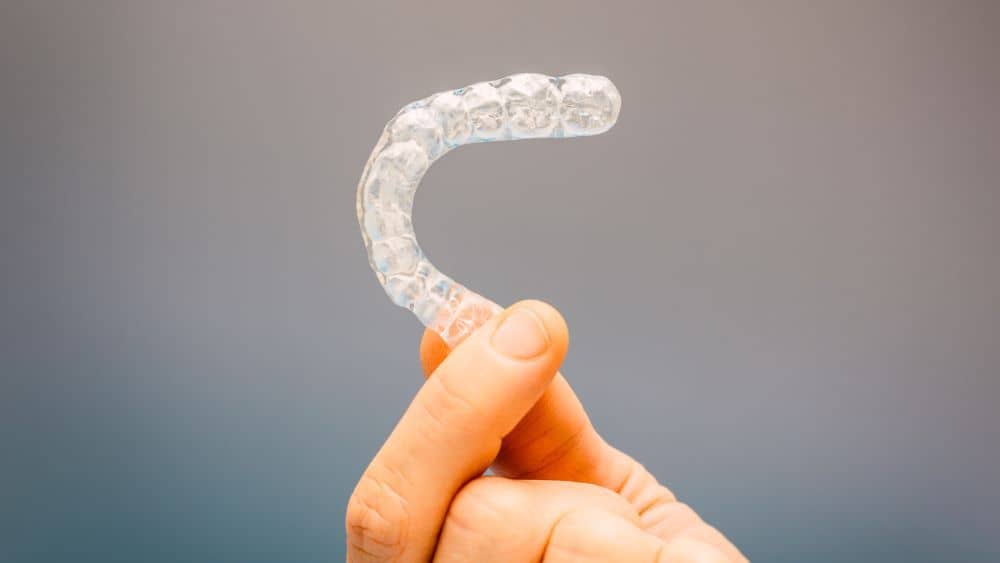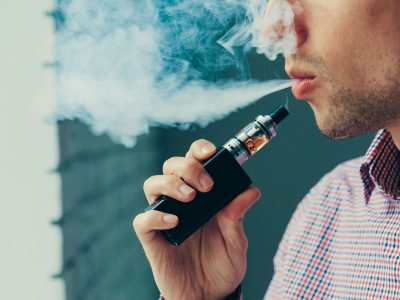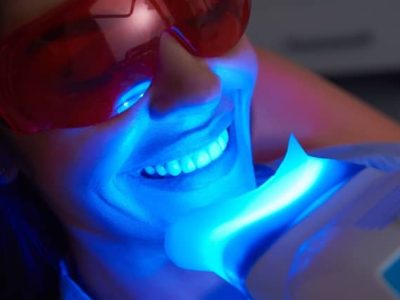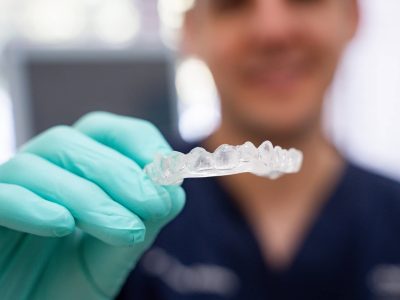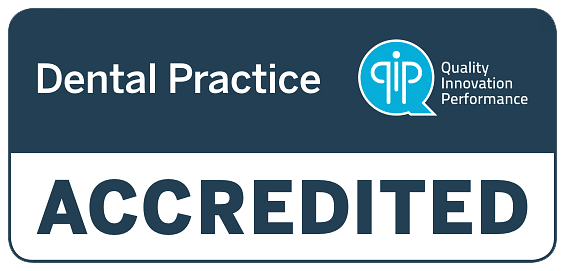Teeth grinding, also known as bruxism, is often ignored. However, it can cause various problems, including headaches, muscle tightness, tooth chipping, and jaw pain. Bruxism is a common condition where a person grinds or clenches their teeth, usually at night while sleeping. Although prevalent, many people don’t even know they grind their teeth.
- Why Do People Clench Their Teeth?
- Is There a Cure for Teeth Grinding?
- How Can Mouthguards Help?
- How to Choose the Best Mouthguard for Bruxism
In this article, you will learn about Bruxism – also known as teeth grinding. You will understand why people do it and how mouthguards can help.
Why Do People Clench Their Teeth?
There is no apparent reason why bruxism occurs. However, it is often believed to be related to stress or anxiety. Dental professionals also agree that caffeine consumption, especially when it is too close to bedtime, can increase bruxism activity. Other causes may be alcohol and cigarettes. People with crooked teeth and an abnormal bite tend to have a higher likelihood of teeth clenching.
While most people grind their teeth when sleeping, it does not mean that bruxism only happens at night. There’s also a condition known as awake bruxism, which denotes that teeth clenching or grinding takes place when the person is awake.
People who grind their teeth at night (also called sleep bruxism) are considered to have a sleep-related movement disorder. Most of the time, if you brux or grind your teeth during sleep, you’re likely to be diagnosed with other sleep disorders. Often, it includes snoring and sleep apnoea, which causes pauses in breathing.
In many cases, mild or occasional bruxism does not require treatment. However, many individuals suffer from bruxism with symptoms that can affect the quality of their life. If left untreated, severe and frequent teeth clenching can damage their teeth and may even lead to jaw disorders.
Most of the time, it is easy to spot if you have awake or daytime bruxism – even though some people may not be aware that they clench their teeth. However, it is even more difficult for those with sleep bruxism because it occurs during sleeping. If you suspect that you grind your teeth at night, the best way to confirm your suspicion is to go to a dentist. But while waiting for your next appointment, you may want to check for clues, such as:
- Flattened teeth
- Chipped teeth
- Loose teeth
- Worn tooth enamel
- Fractured teeth
- Increased sensitivity
- Tooth pain
- Tired jaw muscles, especially when you wake up
- Tight or even a locked jaw that does not open or close properly
- Face pain
- Neck and jaw pain or soreness
- Earache-like symptoms even though the pain is not in the ear
- Dull headache that begins in the temples
- Cheek damage, a typical result of chewing on the inside of the cheeks
- Poor sleep
- Fatigue even if you just woke up
If someone is sleeping next to you, they might complain about the grinding or clenching sounds you make. This is a good indication that you have bruxism, and it should be treated right away.
Is There a Cure for Teeth Grinding?
There is no exact cause for bruxism, so there is no known direct treatment. More often than not, the best way to stop clenching is to treat the underlying cause. For example, if bruxism is caused by stress, you should find ways to beat it, such as yoga and meditation. If you drink coffee, tea, or alcoholic beverages, or if you smoke, you may want to cut down on your consumption. For best results, eliminate them from your life, mainly smoking, as it can have other devastating effects on your teeth and oral health.
Some people are prescribed antidepressants to cope with their stress and anxiety. However, it’s a double-edged sword. While it helps relieve anxiety, certain antidepressants, particularly those containing paroxetine, can increase teeth grinding at night.
If you are taking antidepressants, consuming alcohol, or noticing bruxism symptoms, it’s time to make an appointment with your dentist. A mouthguard may be given to you to help protect your teeth.
How Can Mouthguards Help?
We’ve all seen mouthguards at some point in our lives. You may have even used one when boxing or playing specific contact sports. But mouthguards for bruxism are more specialised. They help even out the pressure you place on your jaw. A mouthguard prescribed by your dentist will create a reliable and robust barrier to prevent your upper and lower teeth from coming in contact with one another. This effectively stops any further damage that could occur. Wearing a mouthguard is also beneficial for your partner since it reduces the grinding noises you often make at night.
You can buy mouthguards over the counter. However, this is not recommended. Your teeth are unique and may have special requirements. In many cases, you may not be able to wear a premade mouthguard because of misalignment, for example. That’s why you should visit your dentist to have it customised. Nevertheless, there are three common types of mouthguards that you can find today:
- Stock or Over-the-Counter Mouth Protectors: As the name suggests, these mouthguards are pre-formed and bought over the counter, such as at department stores, sporting goods stores, or pharmacies. They are generally inexpensive and ready to wear. These products are created to suit most people, but they are not for everyone. You usually cannot do a lot to make them fit your mouth. Some of these protectors are bulky, so it will be difficult for you to talk and breathe while wearing them. That means they are not advised for those with a night or sleep bruxism. Dentists do not recommend stock mouthguards for these reasons. Plus, they provide little to no protection for grinding. If you are involved in sports, however, these mouthguards can be useful.
- Boil and Bite Mouthguards: These products can also be bought in physical stores like drugstores and sporting goods stores. Compared to stock mouthguards, boil and bite products offer a better fit. The idea is to put them in hot water for a few minutes so that the thermoplastic material will soften. When the temperature is tolerable, you should place the mouthguard in your mouth so that it takes after the shape of your teeth. Mould the material around your teeth using your tongue and fingers.
- Custom Mouthguards: To get custom mouthguards, you will need to visit a dental practitioner. In some cases, your dental records will be provided to a professional laboratory based on the instructions provided by the dentist. Customisation often begins by making an impression of your teeth. A mouthguard will then be moulded. The result is a more comfortable product that easily fits around the teeth, offering better protection.
Most of the time, mouthguards are only for the upper teeth. However, if you wear braces or a particular dental appliance on the lower jaw, you may have to wear a mouthguard for the bottom teeth as well. Only a dentist can provide the best possible solution for your case, no matter how unique it may be.
How to Choose the Best Mouthguard for Bruxism
Mouthguards are indeed useful for people with bruxism. They can even help those with sleep disorders, such as snoring and sleep apnoea. However, certain studies have shown that mouthguards can worsen untreated sleep apnoea. This is because they are wearing the wrong type of mouthguard or one that is not approved by dentists.
Mouthguards may look the same and offer the same function, but they are not created alike. You cannot choose drugstore mouthguards to save some cash, especially if you have complicated dental problems. For example, you wear braces, or you have crooked teeth. Wearing the wrong mouthguard will only result in more issues.
Furthermore, cheap drugstore mouthguards are made from soft plastics that are not medical-approved. Because they are more delicate or squishier and do not meet the standards, they cause people to grind their teeth even more, which only defeats the purpose of wearing mouthguards.
But getting a mouthguard from a dentist is not the sole solution to your bruxism. You need to seek more information about how you can improve your case. Patients need to understand their condition so that they can do more things to control their teeth grinding. Otherwise, it’s like getting a helmet because you’ve been hitting your head against the wall for years without really knowing the reason behind it.
What you need is a dental professional from Chelmsford Dental with expertise in bruxism or teeth grinding. Our dentists will properly assess your teeth and oral health to give you the correct diagnosis for your condition. This gives way to finding the best possible treatment that meets your requirements.
At Chelmsford Dental, we offer custom mouthguards that are effective in protecting your teeth from damage due to bruxism. We make sure they are comfortable and can resist tears so that they are longer lasting than your average mouthguards. They are also easy to clean and will not affect your breathing, which is especially important if you have sleep apnoea.
Let us keep your teeth strong with no chipping or fractures while also helping you sleep better at night. Contact Chelmsford Dental today or set up your next appointment.
